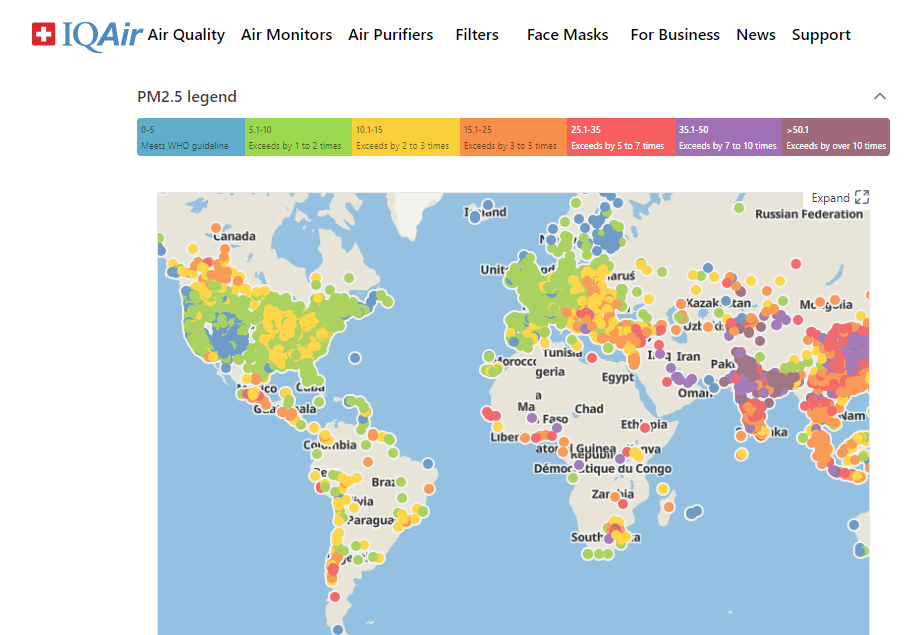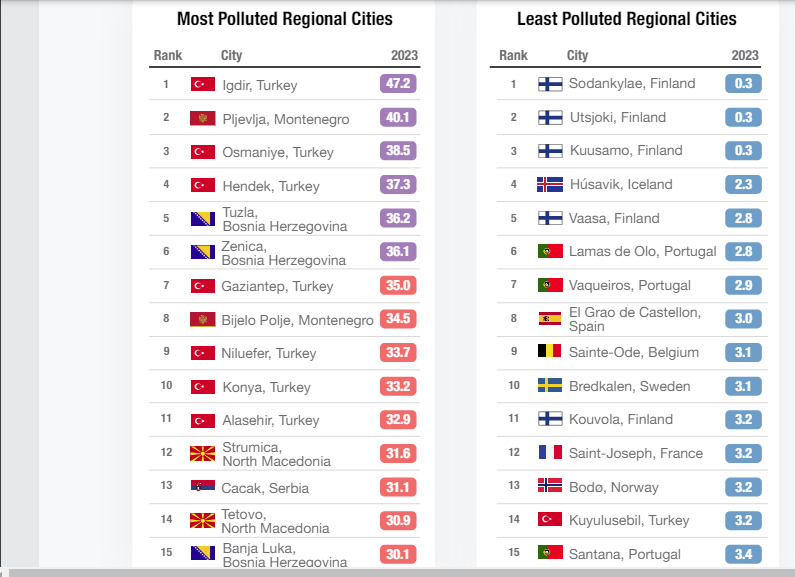Portugal has the 7th cleanest air in Europe as measured by IQAir. This, among other reasons, is why many people love the country, either as a place to visit or seeking a second residency.
This comes at a time when air quality is a concern worldwide. However, it’s not the first time Portugal has come strong on the list of countries that actively do everything possible to maintain the best air quality.
Data from 2020 to 2021 across over 300 European cities in a study by the EEA also showed two Portuguese cities ranking at 2nd and 3rd places. Another Study by UK HouseFresh air quality expert research on the World’s Best and Worst Cities and Towns for Clean Air for the 2020 World Air Quality Report placed Portugal’s town of Alcoutim in the Algarve 3rd place.
Here we’ll talk about Portugal’s present stand compared to other European countries and how the country has maintained its clean air quality standards.

Top countries with the cleanest air in the world
The IQAIR, a Swiss air quality company specializing in air pollution, released its yearly World Air Quality Report examining air quality from over 7,812 cities across 134 countries. To measure air quality, they used Particulate Matter.
Now you may wonder what PM or Particulate Matter is. Particulate Matter (PM) are solid particles and liquid droplets that are present in the air. PMs become airborne through sooth, smoke, dust, and other harmful substances. They come from power generation, industrial machines, car engines, and natural sources like fires, storms, and more.
Because PMs are microscopic, you can also easily inhale them leading to aggravated health problems. Plus, the most harmful PMs are those of about 2.5 micrometers and smaller.
Also, note that Particulate matter isn’t the only outdoor air pollutant. Others include nitrogen dioxide (NO2), sulfur dioxide (SO2) ozone (O3), and allergens like pollen and molds.
According to the WHO, every year about 7 million people lose their lives to air pollution. Furthermore, of the 134 countries, only 10 of these countries meet the Report’s blue band, which determines having the cleanest air. Out of these 10, only 3 countries are in Europe.
The 10 countries include Finland, Estonia, Puerto Rico, Australia, New Zealand, Bermuda, Grenada, Iceland, Mauritius and French Polynesia.

Portugal has the 7th cleanest air in Europe
Now looking at the World Air Quality Report, Portugal has only 6.8 micrograms of PM 2.5 per cubic meter. Compare this to the European Union limits of the presence of PM 2.5 in the air to 25 micrograms.
Hence, it’s clear Portugal meets and even surpasses the EU’s standards. In 2023, Portugal also witnessed a decrease of 1,3 PM 2.5 micrograms from 2022, where it scored 8.1. Then aside from the countries with the cleanest scores (blue band), only Ireland, Norway, and Sweden are ahead of Portugal in the green band. Hence, there are 6 European countries ahead of Portugal and Portugal has the 7th Cleanest air in Europe.
It’s even more amazing that in Europe, the most polluted European country is Bosnia and Herzegovina with 27.5 micrograms of PM 2.5 per cubic meter. However, this country isn’t part of the European Union. Hence, in the EU, the most polluted country is now Greece with 17.4 micrograms of PM 2.5 making it in the Report’s orange band. That said, Spain is the last country in the green band with 9,9 PM 2.5 micrograms per cubic meter.
This goes to show that Portugal has cleaner air than countries like Switzerland, South Africa, India, Israel, Germany, France, Belgium, China, the UK, and the US.
Also it’s noteworthy, that three Portugal cities are also featured in the least Polluted European Cities including Lamas de Olo,at 6th place, Vaqueiros at 7th place and then Santana at 15th position.

How does Portugal maintain Clean Air Quality?
Geographic factors
One of the main reasons Portugal enjoys naturally clean air is its geographic factors. First, the Atlantic Ocean influence brings prevailing winds that carry clean air inland. Plus, there are fewer industrial sources of air pollution and Portugal has an abundance of protected forests and natural areas which act as natural air filters for the country.
Environmental policies
Recently, the country has maintained substantial aspects of its electricity needs through wind, hydro and solar. The country has also previously in 2016 pledged to meet net-zero carbon emissions by 2050. It took these steps even before the European Union as a whole decided to do so. In 2022, the country shut down its last coal plans leaving (imported) fossil gas as the backstop for on-demand power.
Beyond that, 100% of Portuguese people also have access to clean fuels and technologies for cooking among other things, which come with massive health benefits. Furthermore, the country also has regulations for industries and vehicles to minimize air pollutants like particulate matter and nitrogen oxides.
Alternative transportation measures
Public transport in Portugal is one of the many measures in place that has helped the country reduce its PM levels especially compared to pandemic levels. Plus, city authorities in places like Lisbon also invested in cycling, thereby subsidizing the prices people pay for purchasing bikes.
Benefits of Clean Air
We already know why polluted air is harmful. But what are the true positive effects of clean air? Now let’s talk about why you should consider residing in a country that ranks high on the clear air quality scale.
Public Health
First, clean air means improved public health. This in turn means reduced exposure to pollutants like ozone and particulate matter. This further lowers the risks of respiratory illnesses such as asthma, chronic obstructive pulmonary disease (COPD), and lung infections. Hence, it means fewer hospital visits and healthcare costs associated with respiratory issues.
Improved Cognitive Function
There are studies connecting clean air and improved cognitive function. When there are fewer exposures to air pollution, it improves memory, focus, and cognitive performance, particularly in children and older adults.
Enhanced Cardiovascular Health
Clean air can positively impact cardiovascular health. Lower levels of air pollutants like nitrogen oxides have been linked to a reduced risk of heart disease, stroke, and high blood pressure. In truth, Air pollution can trigger heart attacks or strokes. In reality, one in three Americans has heart disease worsened by air pollution. Hence, lower levels of air pollution are better for the heart.
Supports healthy ecosystems
Clean air also aids healthy environments. Plants require clean air for photosynthesis, and reduced air pollution allows them to thrive. This, in turn, supports healthy food webs and biodiversity. Plus you should also note that lower levels of sulfur oxides in the air contribute to a decrease in acid rain. Acid rain damages forests, aquatic life, and historical buildings. Clean air helps protect these valuable resources.
Attraction for Health-Conscious Travelers
Clean air means tourists would love to come to Portugal for a healthy and refreshing vacation.
Portugal’s clean air quality can attract travelers interested in outdoor activities, wellness retreats, and destinations with a focus on environmental sustainability. Clean air also offers clearer skies and better visibility, enhancing the enjoyment of Portugal’s stunning landscapes, historical landmarks, and natural beauty.

Other Reasons to Move to Portugal
There are many more amazing reasons to move to Portugal, especially Portugal’s recent elections in favor of people with favorable immigration values. Beyond cleaner air factors, Europe is also the safest region in the world. According to the 2023 Global Peace Index, Portugal is the 7th safest country in the world and the 5th in Europe.
Plus, Portugal has some sunniest weather in Europe receiving more than 3,000 hours of sunshine per year.
You can also expect their sunniest regions as Lisbon, and the Algarve which are prime spots during the summer months when everybody comes there for beach holidays.
Beyond that, the Portuguese people are extremely proficient in English and are moving towards innovative companies.
You’ll also love that Education at all levels is vital to the Portuguese people. Hence, the country has some of Europe’s best international schools with extremely accessible and low tuition costs.
Conclusion
No doubt, Portugal has the 7th cleanest air in Europe. The country maintains dedication to clean air using diverse strategies ranging from green spaces, emission control to renewable energy and more. Hence, when you want a beautiful place to live, visit and invest, Portugal makes a compelling argument. Here, you can look forward to the true definition of a breath of fresh air, alongside stunning landscapes, a safe environment and a welcoming culture.
Frequently Asked Questions about Portugal’s Air Quality?
Who has the worst air quality in the world?
According to the IQAir report, Bangladesh is ranked with the worst air quality out of 134 countries. Bosnia and Herzegovinia are also ranked the most polluted European country in the same report.
Which European country has the cleanest air?
By the IQAir report, Finland is ranked the country with the cleanest air. It is followed loosely by Estonia and Sweden.
Why does Portugal has the best weather?
Portugal’s clean air comes from its geographic factors. First the country’s position on the southwest tip of Europe, bordering the Atlantic Ocean. Hence, there are winds from the Atlantic moderate temperatures, bringing cooler air in summer and preventing extreme cold in winter. Portugal also benefits from warm Mediterranean temperatures.
Does Lisbon have good air quality?
Following the many reports by EEA, and IQAir for the last consecutive years, Lisbon has good air quality compared to many other countries in the world.
Are the beaches in Portugal clean?
Generally, many beaches in Portugal are very clean. In fact, Portugal has been ranked very highly on the list of Europe’s top beach destinations with a record number of beaches being awarded the coveted Blue Flag for cleanliness and quality in 2023.





